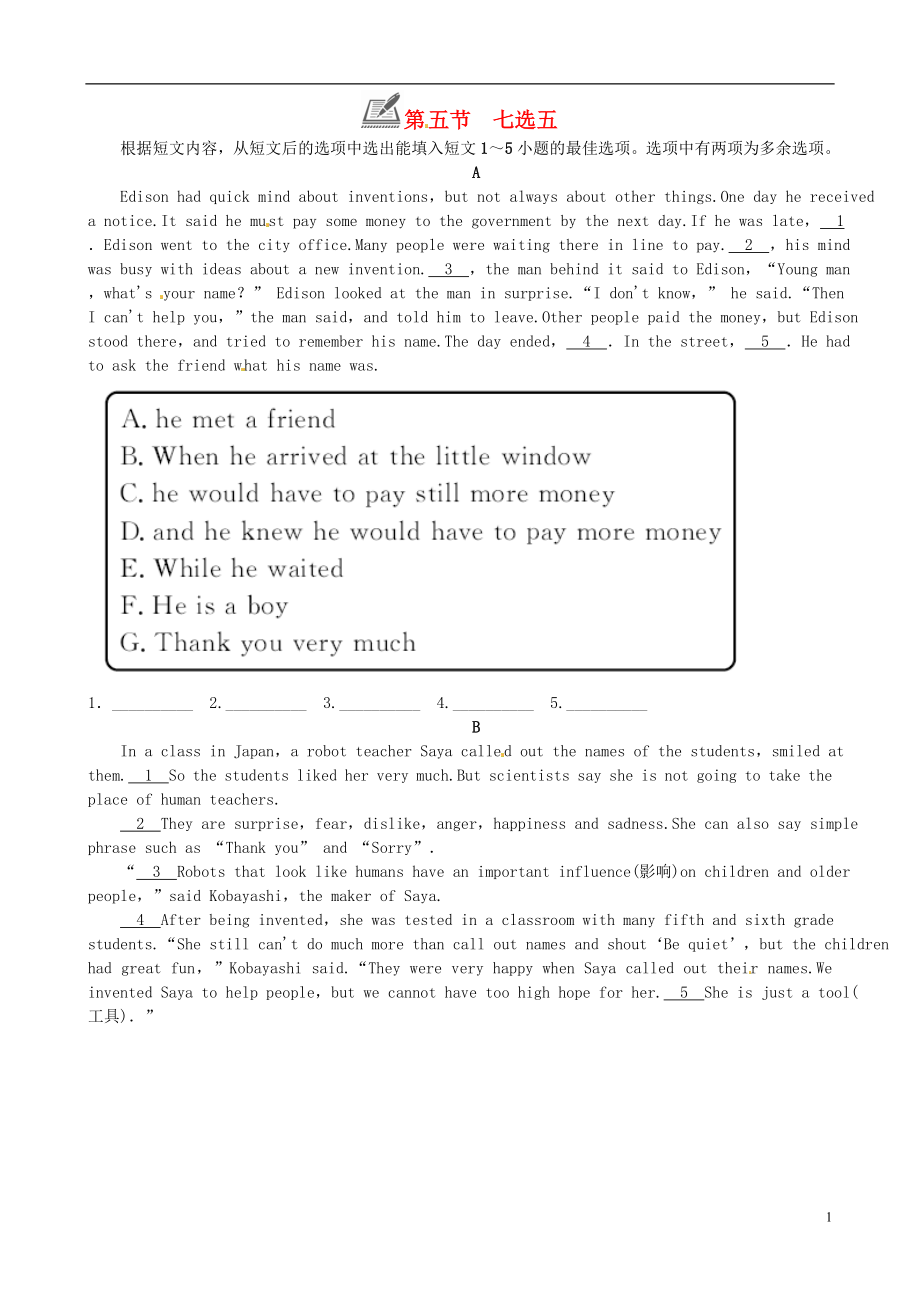《(山東棗莊)九年級(jí)英語(yǔ)全冊(cè) Unit 6 When was it invented第五節(jié) 七選五同步訓(xùn)練 (新版)人教新目標(biāo)版》由會(huì)員分享,可在線閱讀����,更多相關(guān)《(山東棗莊)九年級(jí)英語(yǔ)全冊(cè) Unit 6 When was it invented第五節(jié) 七選五同步訓(xùn)練 (新版)人教新目標(biāo)版(3頁(yè)珍藏版)》請(qǐng)?jiān)谘b配圖網(wǎng)上搜索�����。
1�����、
第五節(jié) 七選五
根據(jù)短文內(nèi)容�����,從短文后的選項(xiàng)中選出能填入短文1~5小題的最佳選項(xiàng)�。選項(xiàng)中有兩項(xiàng)為多余選項(xiàng)。
A
Edison had quick mind about inventions���,but not always about other things.One day he received a notice.It said he must pay some money to the government by the next day.If he was late�, 1 .Edison went to the city office.Many people were wai
2�、ting there in line to pay. 2 ,his mind was busy with ideas about a new invention. 3 �,the man behind it said to Edison����,“Young man�,what's your name?” Edison looked at the man in surprise.“I don't know����,” he said.“Then I can't help you,”the man said���,and told him to leave.Other people paid the money�,
3���、but Edison stood there����,and tried to remember his name.The day ended, 4 .In the street����, 5 .He had to ask the friend what his name was.
1.__________ 2.__________ 3.__________ 4.__________ 5.__________
B
In a class in Japan���,a robot teacher Saya called out the names of the students,smiled at th
4�、em. 1 So the students liked her very much.But scientists say she is not going to take the place of human teachers.
2 They are surprise,fear�,dislike����,anger���,happiness and sadness.She can also say simple phrase such as “Thank you” and “Sorry”.
“ 3 Robots that look like humans have an important
5、influence(影響)on children and older people����,”said Kobayashi,the maker of Saya.
4 After being invented�,she was tested in a classroom with many fifth and sixth grade students.“She still can't do much more than call out names and shout‘Be quiet’���,but the children had great fun�,”Kobayashi said.“They we
6�����、re very happy when Saya called out their names.We invented Saya to help people�,but we cannot have too high hope for her. 5 She is just a tool(工具).”
1.__________ 2.__________ 3.__________ 4.__________ 5.__________
參考答案
A
【篇章導(dǎo)讀】短文介紹了發(fā)明大王愛(ài)迪生的逸聞趣事�����。在一次排隊(duì)交費(fèi)活動(dòng)中����,由于腦子“開(kāi)小差”����,思索自己的一項(xiàng)新發(fā)明�,而忘
7�����、記了自己的名字叫什么�,結(jié)果沒(méi)能及時(shí)交費(fèi),只好詢問(wèn)路過(guò)的一位朋友自己叫什么名字����。
1.C 解析:句意:他將不得不支付更多的錢(qián)。根據(jù)前面的句子“If he was late���,”的語(yǔ)境判斷,如果遲到����,將會(huì)產(chǎn)生什么樣的后果,故答案為C���。
2.E 解析:句意:在他排隊(duì)等候時(shí)�����。根據(jù)后面的句子“his mind was busy with ideas about a new invention.”他腦子里正忙于思索一個(gè)他的新發(fā)明����。而這一思索的過(guò)程�����,是發(fā)生在排隊(duì)等候時(shí)�,故答案為E���。
3.B 解析:句意:當(dāng)他來(lái)到那扇小窗口時(shí)�。根據(jù)后面的句子the man behind it said to Edison,
8、“Young man�,what's your name���?” 可知�����,此句中的代詞it代指上文中的window�,故答案為B�。
4.D 解析:句意:他知道他得付更多的錢(qián)。上文提到如果愛(ài)迪生遲到�,必須要支付更多的錢(qián),因此在最后The day ended����,他意識(shí)到必須要支付更多的錢(qián),故答案為D���。
5.A 解析:句意:在路上他遇到了一個(gè)朋友���。根據(jù)后面的句子“He had to ask the friend what his name was.”可知���,在路上他遇到了自己的一位朋友�����,故答案為A。
B
【篇章導(dǎo)讀】這篇文章主要講了東京的一個(gè)教室里���,一個(gè)叫塞婭的機(jī)器人老師能說(shuō)出學(xué)生的名字���,并對(duì)他們笑����。學(xué)生
9���、們很喜歡它����,但它并不能取代老師的位置���。
1.D 解析:細(xì)節(jié)理解題����。從后面的句子:So the students liked her very much.可知Saya的臉使學(xué)生好笑符合語(yǔ)境。答案是D�。
2.B 解析:細(xì)節(jié)理解題。從后面的句子:They are surprise�����,fear,dislike���,anger���,happiness and sadness.可知Saya有六種感覺(jué)�,故選B���。
3.E 解析:細(xì)節(jié)理解題���。從后面的句子:Robots that look like humans have an important influence(影響) on children and older people���,可知機(jī)器人在未來(lái)會(huì)很重要符合語(yǔ)境�����,故選E。
4.A 解析:細(xì)節(jié)理解題�����。從后面的句子:After being invented����,she was tested in a classroom with many fifth and sixth grade students.可知Saya是在2004年發(fā)明的符合語(yǔ)境。故選A�。
5.C 解析:細(xì)節(jié)理解題����。從前面的句子:but we cannot have too high hope for her.可知Saya不會(huì)思考也不會(huì)學(xué)習(xí)符合語(yǔ)境���。故選C�。
3
 (山東棗莊)九年級(jí)英語(yǔ)全冊(cè) Unit 6 When was it invented第五節(jié) 七選五同步訓(xùn)練 (新版)人教新目標(biāo)版
(山東棗莊)九年級(jí)英語(yǔ)全冊(cè) Unit 6 When was it invented第五節(jié) 七選五同步訓(xùn)練 (新版)人教新目標(biāo)版

